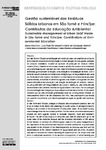Gestão sustentável dos resíduos sólidos urbanos em São Tomé e Príncipe: contributos da educação ambiental

Ver/
Use este enlace para citar
http://hdl.handle.net/2183/22379
A non ser que se indique outra cousa, a licenza do ítem descríbese como Atribución-CompartirIgual 3.0 España
Coleccións
Metadatos
Mostrar o rexistro completo do ítemTítulo
Gestão sustentável dos resíduos sólidos urbanos em São Tomé e Príncipe: contributos da educação ambientalTítulo(s) alternativo(s)
Sustainable management of urban solid waste in São Tomé and Príncipe: contributions of environmental educationData
2017Cita bibliográfica
Ambientalmente Sustentable, 2017, 23-24: 47-62. ISSN: 1887-2417
Resumo
[Resumo] Em São Tomé e Príncipe a modificação dos estilos de vida e dos padrões de consumo tem conduzido ao aumento da importação e comercialização de uma grande variedade de produtos embalados, levando ao aumento da produção de resíduos sólidos urbanos (RSU). Tratando-se de um país insular, a gestão dos resíduos tem constituído um problema acrescido. Ganham, por isso, maior premência os projetos de educação ambiental, que estimulem a redução, a reu-tilização a e a separação na fonte. Com o presente estudo, pretende-se conhecer as utilizações que os frequentadores da Lixeira de Penha fazem dos resíduos recolhidos e a importância económica dessa atividade para as famílias, sensibilizar os diferentes agentes relacionados com a gestão dos RSU para a importância da prevenção e da redução da produção de resíduos. Aplicou-se um questionário aos frequentadores da Lixeira e realizou-se uma entrevista aos representantes das Câmaras Distritais de Água-Grande e Mé-Zochi. Fez-se uma ação de sen-sibilização das crianças que frequentavam a escola mais próxima. Os resultados mostram que há uma perceção generalizada sobre as consequências nefastas do manuseamento direto e do não tratamento dos RSU, mas perpetuam a sua recolha por questões económicas e por falta de aplicação de regras de gestão mais restritivas. [Abstract] In São Tomé and Príncipe, changes in lifestyles and consumption patterns have led to an in-crease in the import and marketing of a wide variety of packaged products, leading to an in-crease in the production of solid urban waste. As an island country, waste management has been a major problem. For this reason, environmental education projects are more urgently needed to stimulate reduction, reuse and separation at source. The aim of this study is to know the uses that the people who go to the dump make of the collected residues and the economic importance of this activity for the families, to sensitize the diferent agents related to the waste management to the importance of the prevention and reduction of waste production. A questionnaire was applied to the residents of the Wastebasket and an interview was held with the representatives of the District Chambers of Água-Grande and Mé-Zochi. An action was taken to sensitize the children attending the nearest school. The results show that there is widespread awareness of the adverse consequences of direct handling and non-treatment of waste, but perpetuates its collection for economic reasons and the lack of more restrictive management rules.
Palabras chave
Resíduos sólidos urbanos
Lixeira
Gestão sustentável de resíduos
Promoção da saúde
Educação ambiental
Urban solid waste
Trash can
Sustainable waste management
Health promotion
Environmental education
Lixeira
Gestão sustentável de resíduos
Promoção da saúde
Educação ambiental
Urban solid waste
Trash can
Sustainable waste management
Health promotion
Environmental education
Dereitos
Atribución-CompartirIgual 3.0 España
ISSN
1887-2417






